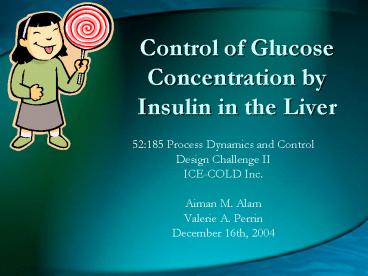Control of Glucose Concentration by Insulin in the Liver PowerPoint PPT Presentation
1 / 40
Title: Control of Glucose Concentration by Insulin in the Liver
1
Control of Glucose Concentration by Insulin in
the Liver
- 52185 Process Dynamics and Control
- Design Challenge II
- ICE-COLD Inc.
- Aiman M. Alam
- Valerie A. Perrin
- December 16th, 2004
2
Outline
- Glucose Regulation
- Model
- Process Variables
- Block Diagrams
- Stability Analysis
- Routh
- Root-locus
- Bode
- Nyquist
- Simulink
- Controller Tuning
- Cohen Coon
- Internal Model Control
- Tyreus-Luyben
- Ziegler-Nichols
- Fine Tuning
- Conclusions
3
What is Glucose?
- Monosaccharide commonly found in the human body
- Hexose (six carbon molecule)
- Exists as a pyranose ring
- Molecular formula C6H12O6
C6H12O6 6O2 ? 6CO2 6H2O Energy
- Blood glucose concentrations in a
- healthy adult range from 70-110 mg/dL
Sources
http//www.psrc.usm.edu/macrog/images/glucose.gif,
Retrieved October 5th, 2004
Nelson, D., Cox, M. (2004). Lehninger Principles
of Biochemistry (4th Ed.). W. H.Publishers.
4
How is Glucose Regulated?
- When blood glucose levels are high
- Insulin produced by beta cells in the pancreas
- As blood glucose concentration rises, insulin
concentration rises to allow for increased
glucose uptake by the organs - High blood glucose levels cause the liver to
convert glucose to glycogen
Insulin
When blood glucose levels are low
- Glucagon produced by alpha cells of the pancreas
- As blood glucose concentration drops, glucagon
concentration increases - Low blood glucose levels cause the liver to
convert glycogen to glucose
Glucagon
Sources
http//www.bodybuilding.com/fun/glycogen.jpg,
Retrieved October 5th, 2004
http//www.cryst.bbk.ac.uk/PPS95/course/8_folds/1g
cn.gif, Retrieved October 5th, 2004
http//www.sickkids.on.ca/HowellLab/images/structu
res/insulin-t6_tmb.gif, Retrieved October 5th,
2004
Nelson, D., Cox, M. (2004). Lehninger Principles
of Biochemistry (4th Ed.). W. H.Publishers.
5
Overview of Blood Glucose Regulation
Sources
http//www.fda.gov/cber/genetherapy/pancislet-img1
.gif, Retrieved October 6th, 2004
6
Model
Assumptions
- F1 F2 F 1 L/min
- Perfectly mixed CSTR
- Constant density
- Constant volume 1 L
- k1 0.0005 L/mgmin
- k2 0.05 min-1
Cg f(Ci0, Cg0)
Component Balances
7
Process Variables
- Controlled variable Cg
- Manipulated variable Ci0
- Disturbance variable Cg0
8
Open Loop System
9
Closed Loop System
10
Closed Loop Transfer Functions
11
Stability Analysis
Routh
Root-locus
Bode Nyquist
12
Routh
13
Root-locus
14
Bode (Kc -4572)
15
Nyquist (Kc -4572)
16
Unit Step in Set Point (Cgsp)
Stable system at Kc gt critical Kc
Sustained oscillatory behavior at Kc
critical Kc
Unstable system at Kc lt critical Kc
17
Unit Step in Disturbance (Cg0)
Stable system at Kc gt critical Kc
Sustained oscillatory behavior at Kc
critical Kc
Unstable system at Kc lt critical Kc
18
Unit Impulse in Set Point (Cgsp)
Stable system at Kc gt critical Kc
Sustained oscillatory behavior at Kc critical
Kc
Unstable system at Kc lt critical Kc
19
Unit Impulse in Disturbance (Cg0)
Stable system at Kc gt critical Kc
Sustained oscillatory behavior at Kc
critical Kc
Unstable system at Kc lt critical Kc
20
Controller Tuning
21
Cohen Coon
22
Unit Step
Set Point (Cgsp)
Disturbance (Cg0)
23
Unit Impulse
Set Point (Cgsp)
Disturbance (Cg0)
24
Internal Model Control (IMC)
25
Unit Step
Set Point (Cgsp)
Disturbance (Cg0)
26
Unit Impulse
Set Point (Cgsp)
Disturbance (Cg0)
27
Tyreus-Luyben
28
Unit Step
Set Point (Cgsp)
Disturbance (Cg0)
29
Unit Impulse
Set Point (Cgsp)
Disturbance (Cg0)
30
Ziegler-Nichols
31
Unit Step
Set Point (Cgsp)
Disturbance (Cg0)
32
Unit Impulse
Set Point (Cgsp)
Disturbance (Cg0)
33
Fine Tuning
34
Unit Step
Set Point (Cgsp)
Disturbance (Cg0)
35
Unit Impulse
Set Point (Cgsp)
Disturbance (Cg0)
36
Ramp
Set Point (Cgsp)
Disturbance (Cg0)
37
Tyreus-Luyben PID Controller
Unit Step in Disturbance (Cg0)
Unit Impulse Disturbance (Cg0)
38
Conclusions
- Nyquist is the sweetest method for obtaining
critical Kc values - System is stable at -4752 lt Kc lt 0
- Best controller is PID using the Tyreus-Luyben
method - Fine tuning led to even better results
39
Andre 3000
Whats cooler than being cool? ICE-COLD!
40
Questions?
- Acknowledgements
- Dr. V.G.J. Rodgers
- The Classes of 04, 05, and 06 Jerry

